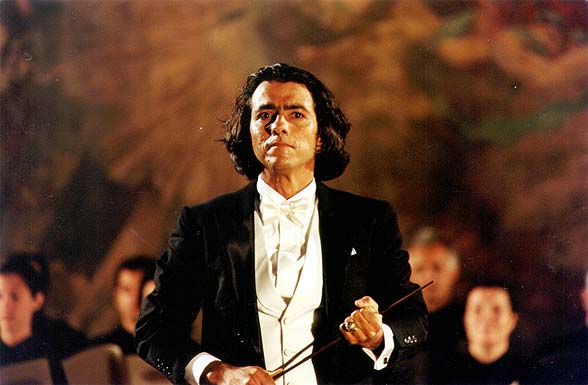Recommended movie: “Villa-Lobos: A Life of Passion”
Villa-Lobos: life and work of the Brazilian music shaman
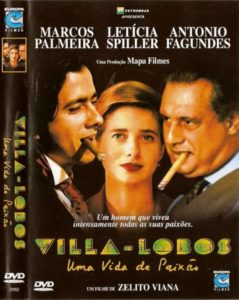 A widespread claim, and unfortunately true, is that we, brazilians, are a people of short memory. It is difficult to pinpoint facts that occurred only a few decades ago, ensures director Zelito Viana, who was forced to do a gigantic research work for an old project, a film about Heitor Villa-Lobos. But, popular wisdom says that there are evils that come to good. At the time of the release of the movie “Villa-Lobos – A Life of Passion” (“Villa-Lobos: Uma Vida de Paixão”, BRA, 2000), digital media was already available on DVD, allowing recording with better sound and image quality.
A widespread claim, and unfortunately true, is that we, brazilians, are a people of short memory. It is difficult to pinpoint facts that occurred only a few decades ago, ensures director Zelito Viana, who was forced to do a gigantic research work for an old project, a film about Heitor Villa-Lobos. But, popular wisdom says that there are evils that come to good. At the time of the release of the movie “Villa-Lobos – A Life of Passion” (“Villa-Lobos: Uma Vida de Paixão”, BRA, 2000), digital media was already available on DVD, allowing recording with better sound and image quality.
If for another theme this would not be important, in this specific case it was fundamental. The rich work of the great Brazilian composer would be lost in a monophonic sound, considering his immense profusion of details. The image, equally important in this movie, would lose the wealth of beautiful photography, as it would be mutilated to be shown in the poor resolution of the old VHS tapes.
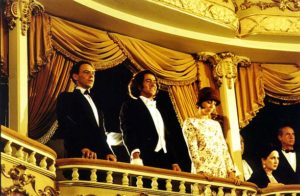 The film could be analyzed by the musical aspect or by the historical accuracy of the facts. If it was difficult for the producers of this movie to get an acurate biography of the conductor, I even dare to question it. From the first aspect, I only remembered Dona Debora, my beloved music teacher from Santa Rita State College, who struggled to teach us some notion of this noble art.
The film could be analyzed by the musical aspect or by the historical accuracy of the facts. If it was difficult for the producers of this movie to get an acurate biography of the conductor, I even dare to question it. From the first aspect, I only remembered Dona Debora, my beloved music teacher from Santa Rita State College, who struggled to teach us some notion of this noble art.
If my musical knowledge continues to be void, I at least managed to identify “O canto do pajé”, which we tried to sing on the Civic Center solemnities. Of course, it never came out as beautiful as the forty-thousand-voice choir ruled by Villa-Lobos, a fact that was recorded in the film.
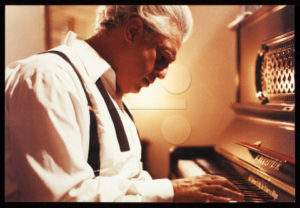
Let us then analyze the film by the best angle we have: the viewer’s. In the doubt between doing a biographical play or a cinematographic work, Zelito Viana certainly opted for the latter. The film used – and abused – the flashbacks, going back and forth in time, to the point of confusing a person unaccustomed to this device. To live the character, Marcos Palmeira makes Villa-Lobos young, while Antonio Fagundes represents him in the mature phase.
Normally, a reference point is used, and from it, one makes trips to the past, to rescue the memories of the character. In the movie, the story begins in 1959, the last day of the artist’s life, and events are shown at different times. Another reference point was Villa-Lobos’ first trip to the United States in 1944. During the trip, he had to be hospitalized, and there are also several flashbacks.
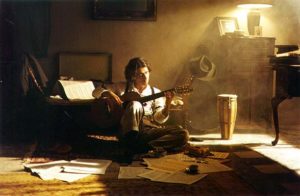 In spite of these comings and goings, the life of the conductor is outlined, showing the people who influenced his life, like the rigorous father, but incentive of the art (Othon Bastos), the loving but castrating mother (Marieta Severo) , Aunt Fifina (Lucinha Lins), who initiated him in Bach, the first wife, Lucília (Ana Beatriz Nogueira), the musician Artur Rubinstein (Emílio de Mello), the second wife, Mindinha (Letícia Spiller), besides others who appear at a glance, as the writer Érico Veríssimo (Marcelo Tás), who was his interpreter in the United States.
In spite of these comings and goings, the life of the conductor is outlined, showing the people who influenced his life, like the rigorous father, but incentive of the art (Othon Bastos), the loving but castrating mother (Marieta Severo) , Aunt Fifina (Lucinha Lins), who initiated him in Bach, the first wife, Lucília (Ana Beatriz Nogueira), the musician Artur Rubinstein (Emílio de Mello), the second wife, Mindinha (Letícia Spiller), besides others who appear at a glance, as the writer Érico Veríssimo (Marcelo Tás), who was his interpreter in the United States.
A controversial point in the biography of Villa-Lobos is the trip he made to the Northeast and North of Brazil in the first decade of the last century. If Villa-Lobos did not go to the Amazon, it does not mean that he has not been very adventurous, since in a country without roads and without communications, as Brazil was at that time, a trip to the interior of Paraíba was already an expedition involving innumerable risks, whether they were wild Indians, endemic diseases, or robbers.
 However, two things make “Villa-Lobos: A Life of Passion” a must-see movie. The first is the portrait that what was made was of the human being, not of the myth. Heitor Villa-Lobos was a person with faults and qualities, who made him loved and hated by many people. The same irascible subject, who did not accept anyone’s authority, used the New State machine to promote music education in public education system.
However, two things make “Villa-Lobos: A Life of Passion” a must-see movie. The first is the portrait that what was made was of the human being, not of the myth. Heitor Villa-Lobos was a person with faults and qualities, who made him loved and hated by many people. The same irascible subject, who did not accept anyone’s authority, used the New State machine to promote music education in public education system.
The man who loved his country, to the point of having it present in all his works, did not accept being presented as a “Brazilian composer” because he considered music a universal value.
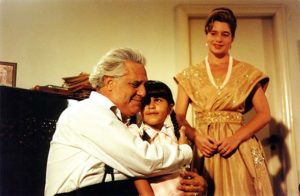 The second aspect, which makes the film very interesting, is the transposition, by images, of several of the compositions of the great master. The best example of this is the recording sequence of “Trenzinho caipira”. Other scenes illustrate moments of creation of certain works, joining the theme and music, in a fascinating set.
The second aspect, which makes the film very interesting, is the transposition, by images, of several of the compositions of the great master. The best example of this is the recording sequence of “Trenzinho caipira”. Other scenes illustrate moments of creation of certain works, joining the theme and music, in a fascinating set.
For lay people like me, besides the well-known Aria of Bachiana No. 5, it was possible to recognize other songs, such as the mentioned “Trenzinho caipira” and “O canto do pajé”. Besides these, other compositions delight the ears of the spectator, in the interpretation of the Brazilian Symphonic Orchestra, and of the Choir of the Municipal Theater of Rio de Janeiro.

Regrettably, the film was not released on Blu-Ray, but the national DVD produced by Playarte had a good quality edition. The original widescreen format was maintained, with good image quality, Portuguese audioDolby Digital 5.1 and 2.0, and subtitles in Portuguese, English, Spanish and French.
In the Extras part, be careful because there are two pages of options, and the best material is in the second one. Among the Extras are: Villa-Lobos biography, production notes, biography of the actors and the director, Making Of (9 minutes) produced by TV Cultura, trailer, testimony of the cast (19 minutes), the documentary “Villa-Lobos – beginning of the project” (23 minutes), technical team testimony (7 minutes), and the video clip “O canto do pajé”.
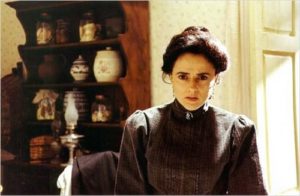 “Villa-Lobos: A Life of Passion” is, as the title says, a movie about passions. Not only the passions of Villa-Lobos himself, music, women, and life, but also from the creators of the movie, who pursued the idea for years, until they succeeded in achieving it. This movie is a living monument to one of the greatest figures of our history, not limited to the factual, but giving a brushstroke of the whole of his work, without leaving aside the human dimension. Congratulations to Zelito Viana, his son Marcos Palmeira, Antônio Fagundes, Letícia Spiller, Ana Beatriz Nogueira, and the entire production team. And, congratulations to us, we can enjoy this movie with a doubled pleasure.
“Villa-Lobos: A Life of Passion” is, as the title says, a movie about passions. Not only the passions of Villa-Lobos himself, music, women, and life, but also from the creators of the movie, who pursued the idea for years, until they succeeded in achieving it. This movie is a living monument to one of the greatest figures of our history, not limited to the factual, but giving a brushstroke of the whole of his work, without leaving aside the human dimension. Congratulations to Zelito Viana, his son Marcos Palmeira, Antônio Fagundes, Letícia Spiller, Ana Beatriz Nogueira, and the entire production team. And, congratulations to us, we can enjoy this movie with a doubled pleasure.

